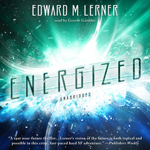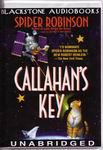
 The Martian
The Martian
By Andy Weir; Narrated by R.C. Bray
Publisher: Brilliance Audio
Publication Date: 22 March 2013
[UNABRIDGED] – 10 hours, 53 minutes
Themes: / astronaut / Mars / engineering / space exploration / NASA /
Publisher summary:
Six days ago, astronaut Mark Watney became one of the first people to walk on Mars. Now, he’s sure he’ll be the first person to die there. After a dust storm nearly kills him and forces his crew to evacuate while thinking him dead, Mark finds himself stranded and completely alone with no way to even signal Earth that he’s alive—and even if he could get word out, his supplies would be gone long before a rescue could arrive. Chances are, though, he won’t have time to starve to death. The damaged machinery, unforgiving environment, or plain old “human error” are much more likely to kill him first. But Mark isn’t ready to give up yet. Drawing on his ingenuity, his engineering skills—and a relentless, dogged refusal to quit—he steadfastly confronts one seemingly insurmountable obstacle after the next. Will his resourcefulness be enough to overcome the impossible odds against him?
That’s right, math made it thrilling. Look at it this way, you’re stranded on a planet that’s essentially trying to kill you. You could just keel over and die … like I would most likely do in the same situation, or you could figure out how to stay alive.
Start with the math. NASA planned for 30 days worth of food for 6 people. The next time someone will be on the planet is in 4 years. Even rationing that food only gets you a little over a year’s worth.
Wait, what if you can’t even contact someone to tell them you’re alive and need to be rescued, more math.
It’s the math that made this book exciting. In fact, this XKCD comic pretty much explains it:

Knowing how long until you’re dead is the suspense.
Couple entertaining math (how is this even possible?) with one of the best characters ever created, Mark Watney, and you have an insanely great story.
Mark Watney is an absolutely hilarious character, especially coupled with the situation he’s in (stranded on Mars) and with whom he’s dealing with (NASA, aka the smartest people ever).
Exchanges like this are that much funnier when it’s freaking NASA he’s talking to:
“[11:49] JPL: What we can see of your planned cut looks good. We’re assuming the other side is identical. You’re cleared to start drilling. [12:07] Watney: That’s what she said. [12:25] JPL: Seriously, Mark? Seriously?”
Probably the best part is that it’s not cause he’s going crazy from being alone for so long, it’s just how he is and that’s awesome.
I not only thought of Watney as a close friend, but I felt like I lived on Mars in this book. You’re constantly aware of how much depends on every little thing not screwing up, how dependent someone is on things we take for granted on a planet that’s actually hospitable to life. And then everything goes wrong.
Which brings me to really the only kind of awkward thing about the book. With the way it’s set up (through log entries and third person omniscient when not with Watney), Andy Weir kind of has to go out of his way to tell you how things are going wrong. Suddenly, you’re brought out of the narrative to be informed how the constant pressure on one area caused the wearing down of material and suddenly … HUGE problem occurs.
Otherwise, I had a blast with this book. The narration by R.C. Bray was top notch. Not that I know anything different, but he nailed the sarcasm and wit of Watney and made this book go more than smoothly. I thought of him as Watney and completely forgot about the narration. That’s when you know it’s good.
This is one of those audiobooks I finished in such a short time because it’s all I wanted to do. I usually have audiobooks for the commute, but this is one you find yourself listening to at every possible moment. That’s when I know I’ve found gold. Eureka, put down what you’re reading and jump on The Martian train (I haven’t lost my metaphors have I?).
5 out of 5 Stars (Cause everything worked together to make this one damn fine read)
 The Martian
The Martian Energized
Energized